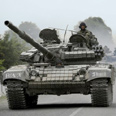
The man, Bashu Mansharov, reported of "an atmosphere of war on the streets." The Foreign Ministry warned Israelis not to travel to Georgia.
According to Mansharov, the Jewish families were scheduled to visit the cemetery on Sunday, and therefore dozens of Israelis have arrived at the town. Despite the tense situation, he said the Jews left in Georgia are not thinking of immigrating to Israel.
"People are not really talking about immigrating to Israel, but should the situation escalate we will definitely do that," he noted.
Gregory Brodsky, a Jewish Agency emissary to Georgia, spoke of the situation of the thousands of Jews living in the country.
"Most Jews live in Tbilisi, where life goes on as usual. We have not received any unusual appeals from the Jewish community, but if the situation worsens we'll do everything to help them."
Meanwhile, the Jewish Agency is helping evacuate Jews living in of Gori to the capital of Tbilisi. A situation room has been opened for information on the Jews in Georgia, and it can be reached on the following number: 972-2-6202202.
Tensions over Georgia's rebel territory of South Ossetia exploded on Friday when Georgia tried to assert control over the region with tanks and rockets, and Russia sent forces to repel the assault.
The president of the Georgian breakaway region was quoted Friday by Interfax news agency as saying that about 1,400 people have died as a result of "Georgian aggression" against South Ossetia.
Fighting between Georgian forces and Russian-backed separatists raged in and around Tskhinvali, the capital of South Ossetia, after Tbilisi sent troops to take back the territory, which broke away in the 1990s.
A senior Georgian security official said Russian jets had bombed the Vaziani military airbase outside the Georgian capital Tbilisi, and President Mikheil Saakashvili said 150 Russian tanks, armored personnel carriers and other vehicles had entered South Ossetia from neighboring Russia.
Reuters and AP contributed to this report















